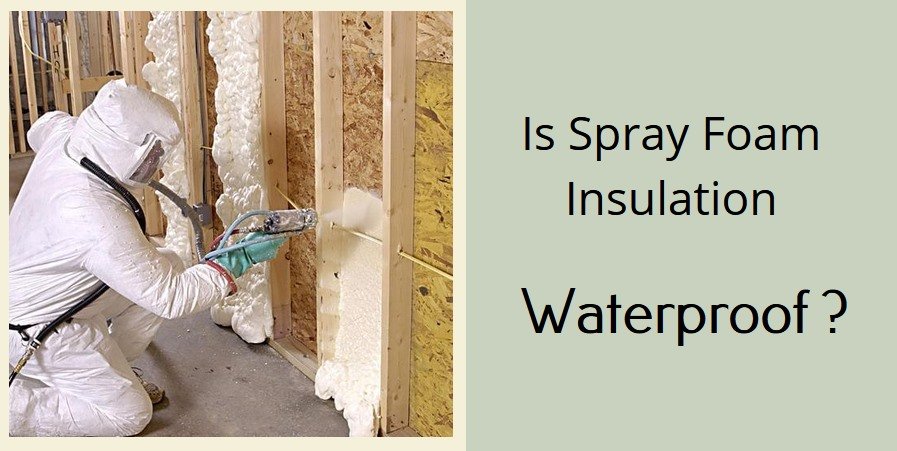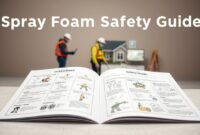Water damage can really hurt homes, leading to expensive repairs and structural problems. Homeowners often look for reliable insulation to keep moisture out. Spray foam insulation that’s waterproof is a great solution to prevent water damage.
I’ve found that not all spray foam insulation is the same. The water resistance of open-cell and closed-cell types is different. It’s important to know these differences to choose the right insulation for your home.
This guide will help you understand how to pick the best water-resistant spray foam insulation. It will cover what you need to know for your specific needs.

Understanding Waterproof Properties in Insulation Materials
Protecting your home from moisture damage is key. Knowing how insulation materials work is important. The right moisture barrier is vital for your home’s thermal protection.
Waterproof vs. Water-Resistant: What’s the Difference?
Many people get waterproof and water-resistant mixed up. Let’s clear it up:
- Waterproof materials stop water from getting in
- Water-resistant materials can handle a little moisture
- Stopping water from getting in needs special material features
Read also: Is Blown-In Mineral Wool Insulation Effective?
Key Properties of Water-Resistant Insulation
Water-resistant insulation has a few key traits:
- It has a closed-cell structure to keep moisture out
- It has special chemical treatments
- It’s made of dense materials
Impact of Moisture on Insulation Performance
Water can really hurt how well insulation works. When water gets into insulation, it:
- Reduces how well it keeps heat out (R-value)
- Can cause mold to grow
- Weakens the structure of your home
Choosing the right moisture barrier is key. It keeps your home energy-efficient and safe from damage.
Types of Spray Foam Insulation: Open-Cell vs. Closed-Cell
Choosing the right spray foam insulation is key. Knowing the difference between open-cell and closed-cell is important. Each type has its own strengths for water resistance, heat control, and insulation.

Open-cell spray foam is soft and spongy. It seals air well but isn’t very water-resistant. This foam can soak up moisture more than closed-cell foam.
Closed-cell spray foam is better at keeping water out. Its dense structure makes it a strong barrier against moisture. It’s perfect for places where water might be a problem.
- Open-cell spray foam characteristics:
- Softer, more flexible material
- Lower R-value per inch
- More affordable
- Better sound dampening
- Closed-cell spray foam advantages:
- Higher density
- Superior water resistance
- Higher R-value per inch
- Structural reinforcement
Choosing between open-cell and closed-cell foam depends on your needs. Closed-cell foam is best for wet areas. Open-cell foam is good for dry, controlled spaces.
| Property | Open-Cell Spray Foam | Closed-Cell Spray Foam |
|---|---|---|
| Water Resistance | Low | High |
| R-Value per Inch | R-3.5 to R-4.5 | R-6 to R-7 |
| Density | 0.5-1.0 lbs/cubic ft | 1.5-2.0 lbs/cubic ft |
| Cost | Lower | Higher |
Is Spray Foam Insulation Waterproof? The Complete Answer
Spray foam insulation is great at keeping your home dry. It’s a top choice for those who want to avoid water damage. This insulation is a big help for homeowners.
Closed-cell foam insulation is the best at keeping water out. It’s different from other insulations because it blocks moisture well. Its special structure stops water from getting in, making it perfect for humid or wet areas.
Water Resistance Capabilities
Moisture can harm many things in your home. Spray foam insulation is very good at stopping water. It keeps water out, stops moisture from building up, and keeps your home strong.
- Blocking water penetration
- Preventing moisture buildup
- Maintaining structural integrity
Performance in Different Moisture Conditions
I’ve seen how spray foam works in different places. It keeps your home safe in humid areas, basements, and places that flood often. Its thick structure keeps water out, protecting your home.
Long-term Durability Against Water
Insulation needs to last a long time. Spray foam insulation is not just good for a short time. It stays water-resistant for years, keeping your home safe from mold, mildew, and damage.
While no insulation is perfect, closed-cell spray foam is very close. It’s a smart choice for keeping your home safe from moisture. It gives you peace of mind and long-lasting protection.
Benefits of Waterproof Spray Foam Insulation
Waterproof spray foam insulation is a game-changer for homeowners. It protects and enhances living spaces in ways traditional insulation can’t. It’s perfect for areas like crawl spaces that are prone to moisture.
- Superior Energy Efficiency: Creates an airtight seal that dramatically reduces energy consumption
- Moisture Protection: Prevents water infiltration in critical areas like crawl spaces
- Structural Reinforcement: Adds strength to walls and building structures
- Mold Prevention: Eliminates moisture that can lead to harmful mold growth
In crawl spaces, spray foam shines. It forms a barrier that traditional insulation can’t match. It stops air leaks, reduces humidity, and keeps your space warm.
| Insulation Feature | Spray Foam Performance |
|---|---|
| Energy Efficiency | Up to 50% improvement |
| Moisture Resistance | Excellent water blocking capabilities |
| Structural Support | Adds rigidity to building structures |
Choosing waterproof spray foam insulation is a smart long-term investment. It may cost more upfront, but it saves you money on energy and maintenance. You’ll enjoy better comfort, lower bills, and a stronger home.
Read also: 5 Disadvantages of Spray Foam Insulation
Factors Affecting Water Resistance in Spray Foam
When you think about spray foam insulation for your home, knowing what affects its water resistance is key. Not all foam insulation is the same when it comes to fighting moisture. The success of closed-cell foam insulation depends on several important factors.

Water resistance in spray foam insulation isn’t a simple one-size-fits-all solution. Many factors work together to decide how well the insulation will keep your property dry.
Read also: Is Spray Foam Insulation Good: Benefits & Facts Guide
Installation Quality: The Foundation of Performance
Proper installation is the most important thing for spray foam insulation’s water resistance. Skilled professionals make sure:
- Every area is covered without gaps
- The right mix and application method are used
- The foam is the same thickness everywhere
- Moisture entry points are sealed properly
Environmental Condition Challenges
Different environments pose different challenges for foam insulation closed-cell systems. Extreme temperatures, humidity, and direct water exposure can all affect how well it works.
| Environmental Factor | Impact on Water Resistance |
|---|---|
| High Humidity | Potential reduced effectiveness |
| Freezing Temperatures | Risk of material contraction |
| Direct Water Exposure | Potential compromised barrier |
Material Thickness: A Critical Consideration
The thickness of spray foam insulation is directly linked to its water-resistant properties. Thicker foam:
- Creates a stronger moisture barrier
- Improves structural strength
- Enhances thermal performance
- Increases durability over time
By carefully looking at these factors, you can boost the water resistance of your spray foam insulation. This helps protect your property from moisture damage.
Best Applications for Water-Resistant Spray Foam
Closed-cell spray foam insulation is a top choice for tough home spots. It’s great for areas where keeping moisture out is key. Let’s look at the main uses that make it a big win for homeowners.
Crawl spaces need strong protection from moisture. Spray foam creates a tight seal against ground moisture. This stops water from getting in and harming the structure. Its dense build is perfect for keeping these areas dry and safe.
- Basements with high moisture levels
- Exterior walls exposed to environmental challenges
- Foundation areas prone to water seepage
- High-humidity rooms like bathrooms and laundry areas
Places at risk of flooding get a big boost from spray foam insulation. It’s smart to focus on areas most at risk of water damage. Spray foam’s strong barrier is key to keeping buildings safe from floods.
Getting it installed right is key to spray foam’s water protection. Homeowners should hire certified pros who know how to tackle moisture issues. With the right spray foam and proper application, your home can fight off water problems effectively.
Installation Guidelines for Maximum Water Resistance
Installing spray foam insulation right is key to keep water out of your home. I’ll show you the important steps to ensure your home stays dry and safe from moisture damage.
First, preparing the surface is essential. Make sure to clean and dry the area well before starting. Any moisture or dirt can ruin the insulation’s job and its ability to keep water out.
- Clean the surface completely
- Ensure the area is completely dry
- Remove any existing damaged insulation
- Check for any spots where water might get in
When applying the spray foam, be very careful. Fill all gaps and voids to make a solid barrier. The right way to apply it is critical to keep water out of your home.
- Use top-notch spray foam equipment
- Apply even, consistent layers
- Cover all spots where moisture could get in
- Make sure the insulation is the right thickness for best protection
Good ventilation is also important. Always keep air moving during and after applying the insulation. This helps avoid moisture buildup and makes sure the insulation dries right.
After it’s all done, do a detailed check. Look for any spots you might have missed or weak points that could let water in. Regular upkeep and checks will keep your insulation working well to keep water out.
Cost Considerations and ROI for Waterproof Spray Foam
Getting spray foam insulation means you need to plan your budget well. The upfront cost might seem steep, but it’s worth it for energy savings and protection.
Spray foam does more than just keep your home warm. When you look at the total cost, consider a few important things:
- Initial installation expenses
- Energy savings
- Maintenance needs
- How it boosts your home’s value
Initial Investment Analysis
The cost of spray foam insulation varies. It’s usually between $1.50 and $3.00 per square foot for a pro to install it. Closed-cell types cost more but offer better water resistance and heat control.
Long-term Savings Benefits
Homeowners often see their money back in lower energy bills. Spray foam can save up to 40% on energy each year. It’s a smart choice for saving money over time.
Maintenance Cost Factors
Spray foam is easy to maintain. It lasts long, so you won’t need to replace or fix it often. This saves you money in the long run. Getting it installed right is key to enjoying these savings.
By weighing the cost of spray foam against its many benefits, homeowners can make a wise choice. It protects their property and saves them money.
Conclusion
Spray foam insulation is a game-changer for keeping homes dry. Closed-cell spray foam is the top choice for fighting moisture. It works great in tough weather conditions.
High-quality spray foam does more than just keep homes warm. It also protects against water damage. Choosing the right spray foam is key to keeping moisture out.
Spray foam does more than just keep water out. It also saves on energy, makes homes more comfortable, and prevents damage from moisture. Getting it installed by pros ensures it works well for a long time.
For those looking to protect their homes from moisture, spray foam is a smart choice. Knowing how it works helps you make better decisions. It keeps your home safe and improves its performance.


